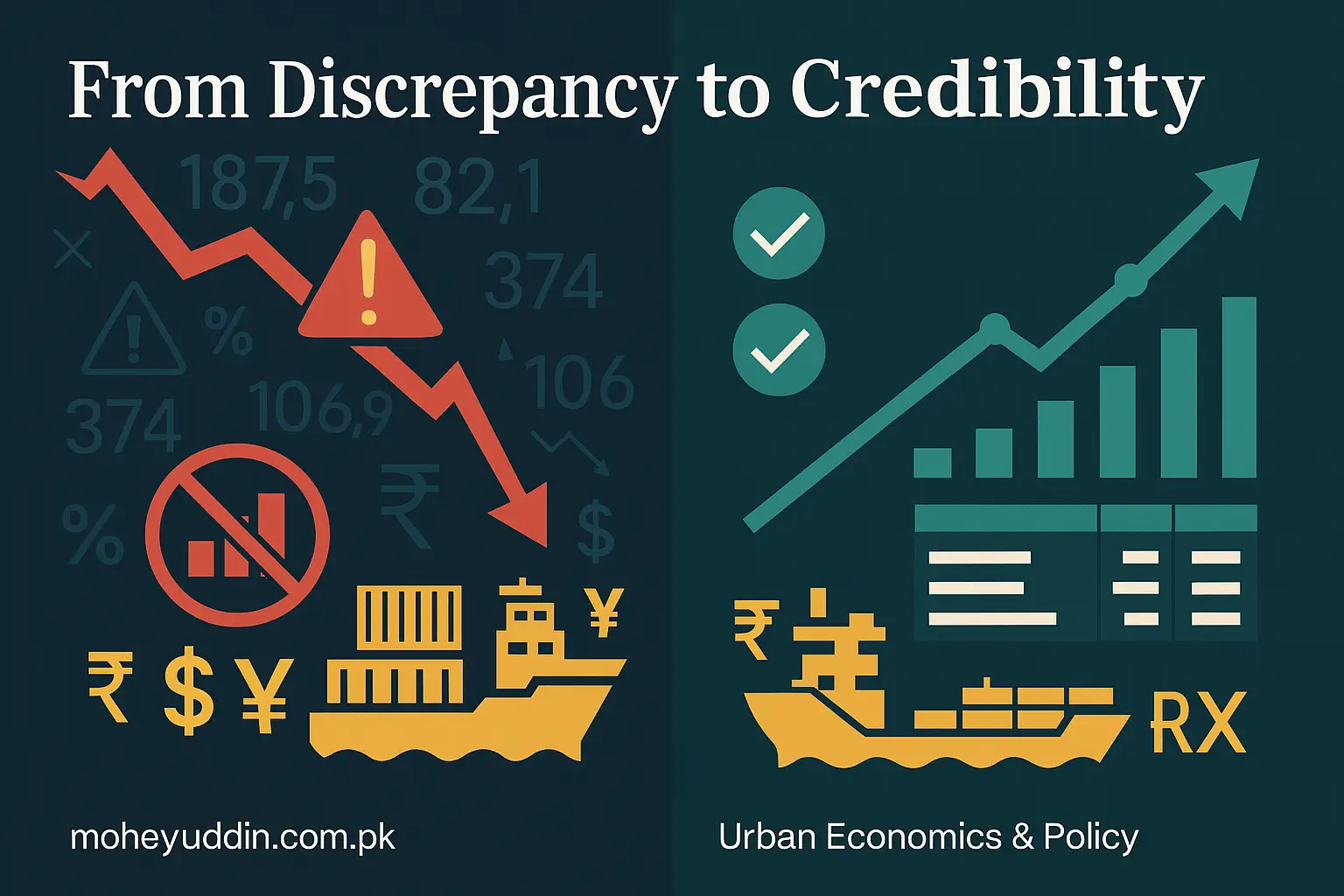Pakistan Trade Data Discrepancy: SBP vs PBS Explained
By: Dr. Ghulam Mohey-ud-din
The Centrality of Pakistan Trade Data in Economic Policy
External trade statistics form one of the primary pillars of economic policy. Upon them rest the decisions that determine monetary adjustments, the framing of fiscal priorities, and the shaping of the country’s stance in the global marketplace.
When such figures fail to align — as has been the case between the State Bank of Pakistan (SBP) and the Pakistan Bureau of Statistics (PBS) — the coherence of policy inevitably suffers.
A Persistent Mismatch Between SBP and PBS Data
For several years, Pakistan has contended with a persistent mismatch in the trade data reported by the SBP and that published by the PBS.
- This divergence has stirred unease among economists and policymakers alike.
- The integrity of national statistics is not a matter of academic concern but a prerequisite for managing the balance of payments and safeguarding national reserves.
- At stake is more than the reconciliation of figures — it is the credibility of Pakistan’s economic governance and the country’s reputation on the world stage.
Origins of the Discrepancy: Method, Not Error
The divergence between SBP and PBS arises not from simple error but from different institutional mandates:
- SBP: Records trade flows through the lens of foreign exchange transactions.
- PBS: Records the physical movement of goods as logged by customs.
Differences in timing, valuation, and coverage are therefore inherent to the two datasets.
When Technical Divergence Becomes a Structural Risk
What might appear as a technical issue has evolved into a structural challenge.
- At times, the gap between the two data series has widened to levels that raise questions about accuracy, transparency, and policy preparedness.
- In an economy already facing currency volatility, external financing pressures, and a fragile investor climate, such uncertainty over trade statistics is an impediment Pakistan can ill afford.
Distortions in Trade Statistics
Under-Invoicing and Informal Settlements
Persistent practices such as under-invoicing distort declared import values to evade duties. Informal settlement arrangements bypass the banking system entirely.
- PBS, reliant on customs documentation, may record understated values.
- SBP, tracking foreign exchange transactions, may see incomplete or missing records.
The Role of Afghan Transit Trade
Afghan transit trade further complicates the picture:
- Consignments bound for Afghanistan may be logged in partner-country export data and pass through Pakistani ports.
- These flows generate no payment obligation for Pakistan.
- Unless excluded, they inflate import tallies and widen the SBP-PBS gap.
The 2025 Reconciliation Effort: A Case Study
That this divergence has persisted for years is troubling enough. That it required extraordinary intervention to reconcile is more telling still.
- In May 2025, a government-appointed reconciliation committee — comprising SBP, PBS, Pakistan Customs, the Directorate of Research and Statistics, and Pakistan Single Window — undertook a detailed review of the 2023 trade data.
- The committee found a 32% discrepancy in import figures, driven largely by trade with China.
- After adjusting for omitted categories, Afghan transit shipments, and valuation differences, the gap fell to 0.54%.
This was a rare demonstration that institutional collaboration and technical precision can yield swift, credible results.
Lessons Learned: The Problem Is Operational, Not Conceptual
The key takeaway: the mismatch is not insurmountable.
- The solution is operational, not conceptual.
- But it must not be episodic. Lasting reforms are required.
Policy Recommendations for Lasting Reform
Permanent Reconciliation Forum
- Establish a standing reconciliation body with SBP, PBS, Customs, and Pakistan Single Window at the table.
- Regularize cooperation instead of ad hoc fixes.
Bridge Statements and Transparency Standards
- Publish bridge statements on a fixed calendar so users can see baselines and adjustments.
- Keep valuation conventions, exchange rate choices, and classification changes in public view.
- Submit external trade series to stronger international dissemination standards for comparability.
Clarifying Institutional Mandates
- Communicate clearly that SBP data reflects financial settlements, while PBS data tracks physical goods movements.
- Neither dataset is “wrong”; both serve valid purposes.
- Clear explanation reduces confusion and allows businesses to interpret trade flows correctly.

Beyond Transparency: Enforcement and Integration
Tackling Under-Invoicing and Informal Flows
- Addressing under-invoicing is both a statistical and fiscal imperative.
- Strengthen customs systems, deploy risk-based inspections, and enforce penalties for misdeclaration.
Integration Through Digital Platforms
- Platforms like Pakistan Single Window can integrate trade and banking records.
- Automated checks between declared imports and payments can reduce gaps.
- Independent audits and capacity-building within PBS will reinforce credibility.
Toward Credible and Trusted Trade Statistics
Where once the SBP-PBS gap cast a shadow over Pakistan’s external accounts, the recent reconciliation exercise has shown that light can be let in.
But this light will fade unless momentum is sustained.
A permanent, transparent, and methodologically clear reconciliation process would not only serve policymakers and markets but also signal to the world that Pakistan takes the integrity of its statistics seriously.
In today’s global economy, where perception shapes opportunity, credible data is not a bureaucratic nicety — it is a national asset.










Leave a Reply